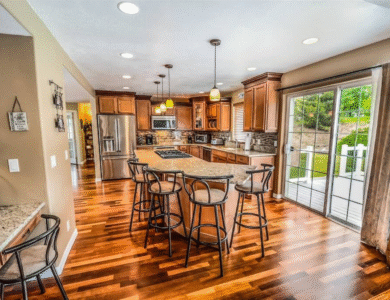How Collaboration Between Homeowners and General Contractors Leads to Success

Key Takeaways
- Effective collaboration between homeowners and general contractors enhances project outcomes.
- Open communication and shared goals are crucial for the success of construction projects.
- Utilizing collaborative tools and technologies can streamline processes and reduce errors.
Embarking on a construction or renovation project represents a significant investment for homeowners, both financially and emotionally. The outcome hinges on the partnership built with the project’s general contractor. Finding the right general contractor Riverview, SC is just the first step—working collaboratively throughout the process ensures that the finished product meets or exceeds expectations. This relationship is more than a contractual agreement; it’s an alliance rooted in trust and shared vision. When homeowners and contractors engage openly and respectfully, they set the foundation for a smoother, more successful project that reflects the homeowner’s intentions and benefits from the contractor’s expertise.
The Importance of Open Communication
Consistent, clear, and honest communication is at the core of any successful construction project. Homeowners need to feel empowered to voice their ideas, preferences, and concerns from the outset. Concurrently, contractors must keep homeowners informed about the project’s status, including any issues that arise or changes that require discussion. Open channels of dialogue help mitigate misunderstandings, reduce stress, and keep everyone aligned toward common goals. This collaborative spirit ultimately strengthens decision-making and provides both parties with a sense of ownership over the project’s results. In fact, many project failures are rooted in communication breakdowns, making it vital for both sides to prioritize ongoing, honest exchanges throughout every phase.
Setting Shared Goals
Successful projects begin with setting clear expectations and shared objectives. During initial discussions, both homeowners and contractors should clarify the project scope, timelines, budget, and desired outcomes to ensure a clear understanding of the project. This alignment ensures that all parties understand what a successful project looks like and the steps required to achieve it. When difficult decisions arise—such as selecting between materials, prioritizing upgrades, or addressing unforeseen obstacles—having a unified vision helps streamline the decision-making process. It is this shared sense of direction that fosters a mutually rewarding project experience.
Leveraging Collaborative Tools and Technologies
The digital era offers a range of solutions that enhance collaboration in construction projects. Tools such as project management software, digital calendars, instant messaging platforms, and cloud-based file-sharing services can simplify communication and streamline workflows. These tools enable both homeowners and contractors to stay informed about project milestones, track changes in real-time, and access essential documents from anywhere.
Incorporating modern project management platforms can notably reduce miscommunication or lost information, resulting in fewer costly mistakes and time delays. For homeowners, this transparency brings peace of mind, while contractors benefit from organized workflows and easier oversight.
Regular Progress Meetings
Routine check-ins—whether in-person, virtual, or by phone—make it easier to review progress, discuss challenges, and refine plans as needed. Scheduling these meetings at key project intervals maintains focus and momentum. Additionally, regular meetings offer a structured setting for raising questions, reviewing milestones, and ensuring the project plan remains realistic and manageable. Continuous engagement enables proactive adjustments when conditions change, helping to prevent last-minute surprises and costly overruns. These meetings also help to celebrate achievements, reinforcing trust between all parties and encouraging a positive project experience.
Building Trust and Mutual Respect
Trust forms the foundation for any productive partnership. For homeowners, this means relying on the contractor’s knowledge and craftsmanship. In turn, contractors should honor the homeowner’s goals, preferences, and needs, respecting their vision for the finished space. Mutual respect fosters better cooperation and enhances the likelihood of delivering a high-quality result on time and within budget. When each side recognizes the value the other brings, a sense of shared purpose emerges. This mutual understanding prevents unnecessary conflicts and keeps the focus on achieving the best possible outcome.
Addressing Challenges Together
Unforeseen challenges are an inherent part of most construction projects. When unexpected issues arise—whether due to weather delays, material shortages, or design revisions—a collaborative approach is vital. By pooling their ideas and resources, homeowners and contractors are more likely to develop creative solutions that resolve problems without major disruption. This team-oriented mindset transforms potential setbacks into opportunities for improvement, reinforcing the project partnership and laying the groundwork for long-term success. Successful renovations often hinge on how well teams adapt to change together.
Conclusion
Collaboration between homeowners and general contractors is crucial for achieving great outcomes in construction projects. By emphasizing open communication, defining shared goals, utilizing digital tools, maintaining regular contact, and fostering trust, both parties can navigate even the most complex projects with confidence. Ultimately, this collaborative relationship ensures that the finished result not only fulfills technical requirements but also brings the homeowner’s vision to life in a way that is cost-effective, efficient, and deeply satisfying.



